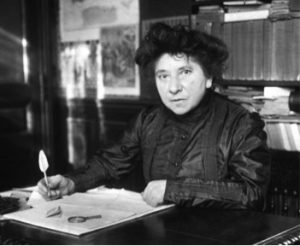Hubertine Auclert (1848-1914)
“Women of France, I tell you from the height of this podium: those who deny our equality in the present will deny it in the future”
Hubertine Auclert (1848-1914) was a militant French activist for women’s suffrage in a nation that feared women’s involvement in politics: The Third Republic. In 1876 she founded the society for the Rights of Women (Société le droit des femmes) that supported equal women’s suffrage; 1883, the organization formally changed its name to Women’s Suffrage Society (Société le suffrage des femmes), which was popular in more liberal and socialist circles across the country, but did not gain large national following, because of its militant strategy.
Auclert was born in the Allier département in the Auvergne area of France into a middle-class family. Her father died when she was thirteen years old and her mother sent her to live and study in a Roman Catholic convent. As a young girl she planned to become a nun but left the convent at age 16. Estranged from her mother, she lived with her uncle for a time but had to return to the convent a few years later. In 1869, she left the convent for good and moved to Paris, where she lived here whole adult life. The experience of the convent made her an outspoken anti-cleric. In Paris she became interested in politics and founded 1876 she founded the Société le droit des femmes (The Rights of Women) that explicitly supported women’s suffrage as the first in France. In 1883, the organization formally changed its name to the Société le suffrage des femmes (Women’s Suffrage Society).
Auclert founded a feminist newspaper, in 1881, when the French censorship laws became more liberal, La Citoyenne (The Female Citizen), which came out for ten years. In it she argued vociferously for women’s enfranchisement. Full civil and political citizenship for women was one of the major aims Auclert fought for. She argued that eliminating half of the population from voting and being directly involved with politics was hurting the nation. This made the country seem less civilized and allowed men to see women as being “uncivilized.” The older Auclert got, the more outspoken and strong her views became. In the end she stopped paying her taxes, claiming that she has no rights and thus does not need to pay. One of her most lasting accomplishments is that she popularized the word feminist in France. With this word she gave a unifying term to people fighting for women’s rights.
Hubertine Auclert is still relevant today because she was a French feminist pioneer. As a militant, she was not the most popular, but she led the path for other women to follow. She allowed more moderate women to be seen as moderate compared to her, and gain followers that otherwise would not have related to their message or had the confidence to support women’s rights. Her fight for equality of women was able to pinpoint the pitfalls of a male dominated society.
Grayson Holmes, History and Philosophy, Class of 2020
Sources
Literature and Websites
- Eichner, Carolyn J. La Citoyenne in the World: Hubertine Auclert and Feminist Imperialism. Durham: Duke University Press, 2009.
- Nuñez, Rachel. Rethinking Universalism: Olympe Audouard, Hubertine Auclert, and the Gender Politics of the Civilizing Mission. New York: French Politics. Culture & Society, 2012.
- “Auclert, Hubertine (1848–1914).” Women in World History: A Biographical Encyclopedia, at: http://www.encyclopedia.com/women/encyclopedias-almanacs-transcripts-and-maps/auclert-hubertine-1848-1914. Accessed: April 11, 2018.



